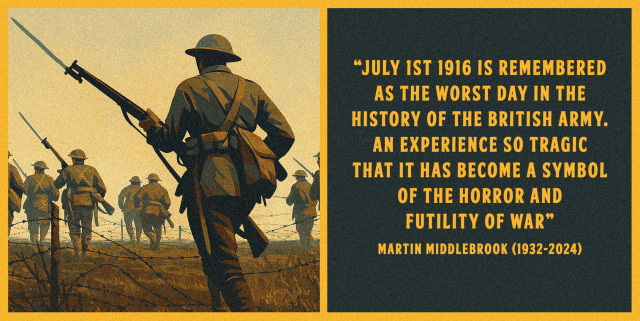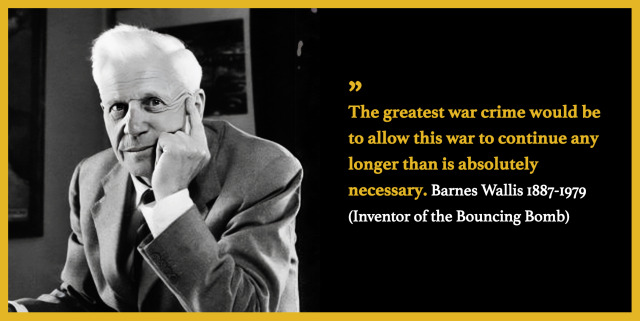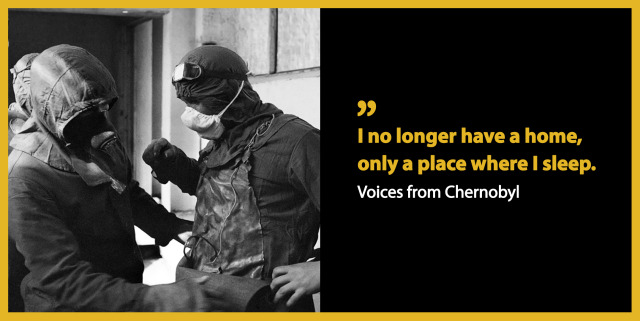
“July 1st 1916 is remembered as the worst day in the history of the British Army. An experience so tragic that it has become a symbol of the horror and futility of war” (Martin Middlebrook)
On this day in 1916, the Battle of the Somme began. At 7:30am, officers’ whistles were blasted as wave after wave of British soldiers rose from their trenches and charged into a storm of bullets. It would make history for all the wrong reasons. By the end of that first day, more than 19,000 were dead, many within moments of leaving the safety of the trenches.
It was meant to be a breakthrough but instead, it became a vast and sprawling graveyard. The fields of northern France were soaked not just with rain and mud, but with the blood of young men some barely out of school. Their letters home spoke of their unwavering courage and duty. In the months that followed, over a million young lads would fall in the name of victory.
We remember the Somme to honour those lives, but also to face the reality of a broken world. A world crying out for peace yet unable to find it. That’s the world Jesus stepped into but not to stay distant from the trenches of our pain. He walked among the wounded and bore the full weight of sin and sorrow on the cross. In the silence of remembrance today, his voice still speaks into a suffering world “Come to me, all who are weary and burdened, and I will give you rest”

“You must put your trust in me and your life in my hands” (Charles Blondin at Niagara Falls)
On 30th June 1859, Charles Blondin crossed Niagara Falls on a 1,000-foot-long tightrope. 100 feet below him, the raging waters were ominously waiting to sweep him to his death. Added to that, the wind that blew through the gorge that day would bring a helicopter down if it happened today. Crowds turned out to watch the stunt, lining the cliffs on both sides of the Niagara River. At 5pm, Blondin stepped onto the rope and after 30 minutes he was safely across.
To everyone’s amazement, he then handpicked a spectator to accompany him on the return trip. The man clung on for dear life as Blondin made his way inch by inch along the tightrope only to stumble with exhaustion halfway across. The acrobat told his terrified passenger to put his trust in him and in return Blondin carried him safely to the other side.
Throughout history, millions of people have chosen to put their trust and faith in the God who created them. If you do that today, he will lead you safely through this life whatever it sends your way. God has carried multitudes across the great divide of time and eternity, and he hasn’t lost anyone yet!

There were times when I had great times with my brothers but I would often cry from loneliness (Michael Jackson 1958-2009)
On this day in 2009, the world was stunned by the sudden death of the global icon, Michael Jackson. His voice, his dance and his style captivated entire generations. But behind the lights and the legend was a man marked by deep struggle. Despite his fame and fortune, there were hints of profound sadness, confusion and a search for something more than the adoration of his fans.
There’s something deeply sobering about the way the world reacted to his death. Billions mourned, tributes poured in and yet people wondered whether he was ever truly known. Jesus once said, “What does it benefit a man, if he gains the whole world and forfeits his soul?” It’s a haunting question, especially considering lives like Michael Jackson’s.
Adoration can fill stadiums, but it doesn’t heal wounds. Success might impress the world, but it cannot bring peace. The Gospel says that it isn’t about what we achieve in life or how we are seen. The Bible speaks of a Saviour who knows our scars, stood in our place and offers us life to the full. Not a performance-based existence, but the chance to be loved unconditionally. That invitation still stands today, for the famous, the forgotten and for us all.

“We were told to love our Mother Country, but we found out that our Mother Country didn’t love us”
On this day in 1948, the Empire Windrush docked at Tilbury in Essex. Onboard were 492 Caribbean men and women who had answered Britain’s call for help in rebuilding a nation shattered by war. They came with hope in their hearts and promises ringing in their ears of opportunity, dignity and welcome.
One young Jamaican man left home with three instructions from his mother “Find a Post Office and send me a letter, find a church to thank God, and find a friend to walk beside you.” His reply was haunting “Dear Mum, I’ve found a Post Office.” The silence around the other two speaks volumes. Friendship was scarce, and the church closed its doors.
Today, a new generation is refusing to inherit the prejudices of the past, challenging the ludicrous idea that skin colour defines worth. The name ‘Windrush’ carries a deep meaning echoing the mighty wind spoken of in the Book of Acts in the Bible when the Holy Spirit filled the early followers of Jesus and propelled them to every nation with a message of radical grace. That Gospel calls every person to be forgiven, restored and welcomed into a new kind of family.

Death is nothing, but to live defeated and inglorious is to die daily” (Napoleon Bonaparte)
On this day in 1815, the fate of Europe was decided in a muddy Belgian field. Napoleon Bonaparte, once the master of the continent, faced a coalition led by the Duke of Wellington and the Prussian general Blücher. It was a brutal and bloody day. For hours, cavalry charges, cannon blasts, and infantry lines clashed in the rain-soaked fields near Waterloo. By nightfall, Napoleon’s army was broken, and his empire lay in ruins. The man who once seemed unstoppable had fallen.
History reminds us that no matter how powerful someone becomes, their rule never lasts forever. Jesus said, “What does it profit a man to gain the whole world, yet forfeit his soul?” Napoleon gained almost everything, yet in the end, he lost it all. At Waterloo, ambition met its limits.
Christ offers a different kind of kingdom, not built by conquest, but by sacrifice. Not sustained by fear, but by grace. His victory wasn’t won with armies, but with a cross. In a world where power is fleeting, Jesus remains unshakable. The Battle of Waterloo brought a temporary peace to Europe, but the peace Jesus brings goes far deeper. It’s a peace with God that doesn’t come through battle but through surrender. Not to a general, but to a Saviour.

“There are laws that enslave people and laws that set people free”
On this day in 1215, in a quiet field at Runnymede near London, a defiant group of landowners forced King John of England to sign a document that would change history. Sick of heavy taxes and royal corruption, they stood their ground, and the result was Magna Carta, the Great Charter of Freedoms. For the first time, a king was told “You are not above the law”.
Magna Carta set out rights that protected ordinary people from abuse by the powerful. It declared that justice must be given freely, that no one should be punished without a fair trial and that rulers were accountable not just to men but also to God. Many call it the foundation of democracy, but its heartbeat echoes something even older.
Over a thousand years before Runnymede, Jesus stood on a hillside and gave what’s often called the Sermon on the Mount or the Magna Carta of God’s Kingdom. It was radical then and it’s still revolutionary now. Love your enemies, care for the poor and live with integrity. Where human laws can only go so far, Jesus sets out a way that changes hearts, communities and history itself. His law doesn’t just restrain, it restores.

“I don’t blame people for their mistakes, but I do ask that they pay for them” (John Hammond played by Richard Attenborough)
On this day in 1993, Jurassic Park burst onto cinema screens, changing the face of modern filmmaking. With groundbreaking CGI and a pulse-pounding score, Spielberg’s masterpiece brought dinosaurs back to life and captivated the world. But beneath the thrills and spectacle lay a warning: just because we can do something doesn’t mean we should.
In the film, scientists recreate ancient creatures and attempt to control them within the safety of a theme park. But life, as Dr Ian Malcolm famously said, “finds a way.” The systems fail. The creatures escape. Chaos erupts. It’s a sobering picture of human ambition and the illusion that we’re in control.
That same illusion plays out in real life as people try to engineer happiness and run the show. But the Gospel tells a different story. We weren’t made to be gods; we were made to know God. Jesus offers more than survival; he offers restoration. In a world filled with broken systems and uncontrollable outcomes, he’s the one who brings peace, purpose and true life. Jurassic Park gave us a glimpse of unleashed chaos. The cross gives us a way back from it.

“Let us all beseech the blessing of Almighty God upon this great and noble undertaking” General Dwight Eisenhower
On this day in 1944, the southern shores of England became the launchpad for the greatest seaborne invasion in history. 150,000 Allied troops boarded landing craft and aircraft, bound for the beaches of Normandy. It was a bold strike against the darkness that had gripped Europe and a moment when freedom itself hung in the balance.
That same evening, King George VI addressed a nation holding its breath. His words carried faith as well as resolve: “We ask not that God may do our will, but that we may be enabled to do his.”He called the people to pray, to join in the suffering of Europe, and to strengthen those risking everything to set the captives free.
2,000 years before D-Day, another mission of liberation had already begun. Jesus Christ invaded a broken world not with force, but with love. Through his life, death and resurrection, he broke the power of sin and death and offered a freedom no army could win. The greatest rescue didn’t happen on a beach, it happened on a cross. And that freedom is still on offer today, to anyone willing to receive it.

“Christ not only revealed to us the truth in his teachings, but he also lived by what he believed and gave us the strength to try to do the same” Queen Elizabeth II
On this day in 1953, the world watched as a young woman stepped into history. Queen Elizabeth II was crowned in Westminster Abbey, beginning a reign that would span seven decades and shape the lives of millions. But the moment her life truly changed came months earlier, in the most unexpected way.
At just 25 years old, Princess Elizabeth was on a royal tour of Kenya with her husband, Prince Philip. One afternoon, she climbed a tree for a bit of fun. But while she was up there, news reached her that her father, King George VI, had died. She had gone up the tree a princess and came down a queen.
It reminded me of a story from the Bible about another person who climbed a tree. Zacchaeus wasn’t royalty, he was a crook hiding from the crowd and his guilty past. But Jesus saw him, called him by name and it changed everything. Two people, two trees and two life-changing descents. If you sense Jesus calling your name today, come down. It might just change everything for you too.

“Your mission, should you choose to accept it…”
On this day in 1996, Mission: Impossible burst onto the big screen relaunching the epic 1960’s franchise to a whole new audience. Eternally youthful megastar Tom Cruise overcomes exploding aquariums and dangles from ceilings by a thread in adrenaline fuelled actions scenes. His character, Ethan Hunt, is now the face of eight impossible missions (and counting) in his pursuit of truth and justice!
Behind the spectacle lies this important question “What mission truly matters?” The Bible tells of one far greater than espionage, gadgets or global conspiracies. It was launched not from the shadows, but from Heaven itself. Jesus came not to destroy villains but to save the very people who had turned against him. In his own words “I have come to seek and save the lost”
Unlike the IMF (Impossible Missions Force) Jesus never said, “This message will self-destruct” Instead, his words endure forever. Ethan Hunt’s mission demanded risk, but Christ’s mission required the sacrifice of his life for ours. While Hunt fights for justice alone, Jesus offers forgiveness, a new beginning and an eternal hope. While his mission was successfully completed on the cross, the ongoing mission to fill the earth with the message of new life is ongoing.

The greatest war crime would be to allow this war to continue any longer than is absolutely necessary (Barnes Wallis – Inventor of the Bouncing Bomb)
On May 16th 1943, an elite RAF squadron carried out a dangerous operation deep in the industrial heart of Germany. Their mission was to attack three huge dams holding back 100 billion gallons of water, critical to the production of hydro-electric power that turned the cogs of the Nazi war machine.
Les Knight, a 22 year old bomber pilot was known among the ranks of 617 Squadron for his deep personal faith in God. Despite the complex moral dilemma, he volunteered to fly one of the Lancaster bombers on the Dams Raid. Although he survived the raid, he was killed weeks later returning from another mission. His wireless operator said this at his funeral. “He kept that damaged aircraft flying allowing us to parachute out and live. In doing so he gave his life for us”
Pilot Officer Les Knight DSO would have been very familiar with these famous words from the Bible “Greater love has no one than the one who lays down his life for his friends” Words describing the mission of Jesus who, through his selfless death of the cross, bridged heaven and earth allowing us all to ‘bail out’ of a perilous existence separated from God and into the eternal security of relationship with him.

“Every child saved with my help is the justification of my existence on this Earth, and not a title to glory” (Irena Sendler)
A 98-year-old retired nurse called Irena Sendler died on May 12th 2008. She had worked as a midwife in the notorious Warsaw Ghetto during Nazi Holocaust, smuggling Jewish babies out of the hospital, in the bottom of a medical bag she carried in her car. She also had a dog she’s trained to bark at the checkpoint masking the sound of the crying babies.
Every one of the 2,500 children that were rescued were taken to the safety of the convent, but Irena was eventually caught and tortured. The records of all the children were kept and after the war, Irena attempted to locate Jewish parents that had survived the holocaust and reunited the family. The ones who were orphaned were adopted into new families.
In her last days, Irena Sendler was nursed by one of the children she had saved from the Warsaw Ghetto. Some years ago she was nominated for the Nobel Peace Prize but wasn’t selected. The winner that year was Al Gore who did a presentation on global warming. Irena Sendler knew that the value of every human life is the price tag that is placed on them by God.

God sent me to do something and nobody can stop me. If God wants to stop me, then I’ll stop, but man can never stop me” Bob Marley
Bob Marley died on this day in 1981 at the age of 36. Very few artists have provided the soundtrack for a people and a generation like him. All these years after his passing, Marley’s music and legacy is as strong as ever. He was born shortly before the end of WW2 on the Caribbean Island of Jamaica to a white father and a black mother.
Although brought up with a strong Christian influence, Marley’s is most associated with the Rastafarian religion that asserts that Africa is Zion and the Ethiopian Emperor, Haile Selassie and the second incarnation of Jesus Christ. What is lesser known is that the great man was baptised in a New York hotel room in 1980.
His funeral was not a Rastafarian one, but a celebration deeply rooted in Christian songs, Bible readings and prayers. A former backing singer for the Wailers, said that when Marley was dying, he stretched out his hand and said, “Jesus take me”. She said that he did not die a Christian Rasta, but a Rasta-turned-Christian.

“Jesus has broken down the barrier of the dividing wall and made us one” (Ephesians 2:14 The Bible)
Several years ago, I spent six months visiting the infamous Calais Jungle migrant camp where our team, amongst other things, were caring for vulnerable and unaccompanied young people. I went through the Channel Tunnel many times over that period, often being stopped and searched by the border police.
On one of the days, I was there, I saw a famous photograph that was taken during the construction of that tunnel that connects England and France. Two workmen, who remained friends for years, shook hands and exchanged flags at the breakthrough moment when the two ends of the tunnel met deep beneath the seabed.
2,000 ago, Jesus died on a Roman cross and in doing so, he connected two sides that had been separated by humanity’s rejection of God. He paid the ultimate price for our wrongdoing, becoming the divine connecter that spans time and eternity. He is the way back to relationship with our creator. Open your heart and your life to him today.

“I no longer have a home, only a place where I sleep.” - Voices from Chernobyl
On this day in 1986, an explosion blew the roof off reactor building number 4 at the Chernobyl Nuclear Power Station. Radiation was released into the atmosphere, leaving a death-trail over Ukraine, Belarus and Russia. It would be many years before scientists would fully understand the extent of that catastrophe.
The authorities had to act quickly, and a team was recruited to enter the stricken site with bulldozers to fill the hole. Knowing they could die or even worse live, with the appalling effects of exposure to the radiation, they signed up for the mission. Although just two workers were killed from the initial blast, many more would die in the first three months after the explosion.
2,000 years ago, God sent his son to fill the crater within the human soul caused by our rejection of him and his plan for our lives. Jesus was the only person who could do the job. He was spotless and free from the failures that blight our lives and separate us from a perfect Creator God. The Bible says Jesus willingly laid down his life as a ransom for many and through his completed work on the cross, we can be salvaged and reborn into God’s eternal plan.
